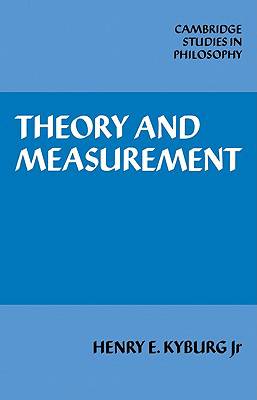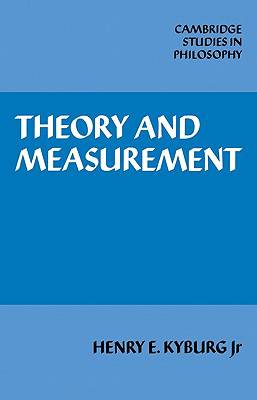
Bedankt voor het vertrouwen het afgelopen jaar! Om jou te bedanken bieden we GRATIS verzending (in België) aan op alles gedurende de hele maand januari.
- Afhalen na 1 uur in een winkel met voorraad
- In januari gratis thuislevering in België
- Ruim aanbod met 7 miljoen producten
Bedankt voor het vertrouwen het afgelopen jaar! Om jou te bedanken bieden we GRATIS verzending (in België) aan op alles gedurende de hele maand januari.
- Afhalen na 1 uur in een winkel met voorraad
- In januari gratis thuislevering in België
- Ruim aanbod met 7 miljoen producten
Zoeken
€ 64,95
+ 129 punten
Omschrijving
Measurement is fundamental to all the sciences, the behavioural and social as well as the physical and in the latter its results provide our paradigms of 'objective fact'. But the basis and justification of measurement is not well understood and is often simply taken for granted. Henry Kyburg Jr proposes here an original, carefully worked out theory of the foundations of measurement, to show how quantities can be defined, why certain mathematical structures are appropriate to them and what meaning attaches to the results generated. Crucial to his approach is the notion of error - it can not be eliminated entirely from its introduction and control, her argues, arises the very possibility of measurement. Professor Kyburg's approach emphasises the empirical process of making measurements. In developing it he discusses vital questions concerning the general connection between a scientific theory and the results which support it (or fail to).
Specificaties
Betrokkenen
- Auteur(s):
- Uitgeverij:
Inhoud
- Aantal bladzijden:
- 284
- Taal:
- Engels
- Reeks:
Eigenschappen
- Productcode (EAN):
- 9780521108584
- Verschijningsdatum:
- 9/04/2009
- Uitvoering:
- Paperback
- Formaat:
- Trade paperback (VS)
- Afmetingen:
- 140 mm x 216 mm
- Gewicht:
- 362 g

Alleen bij Standaard Boekhandel
+ 129 punten op je klantenkaart van Standaard Boekhandel
Beoordelingen
We publiceren alleen reviews die voldoen aan de voorwaarden voor reviews. Bekijk onze voorwaarden voor reviews.









